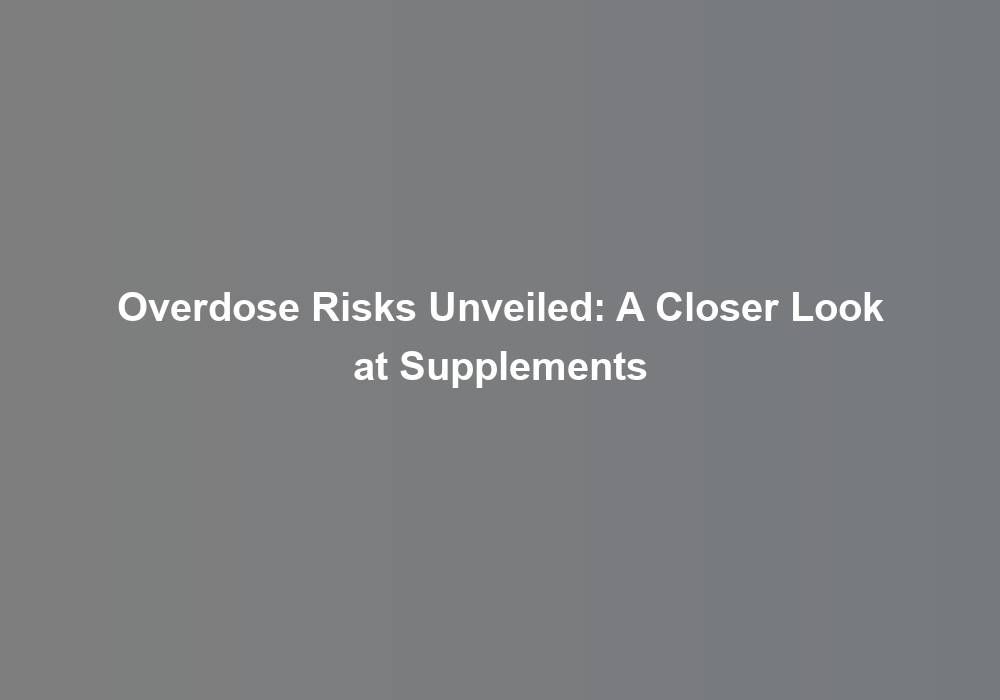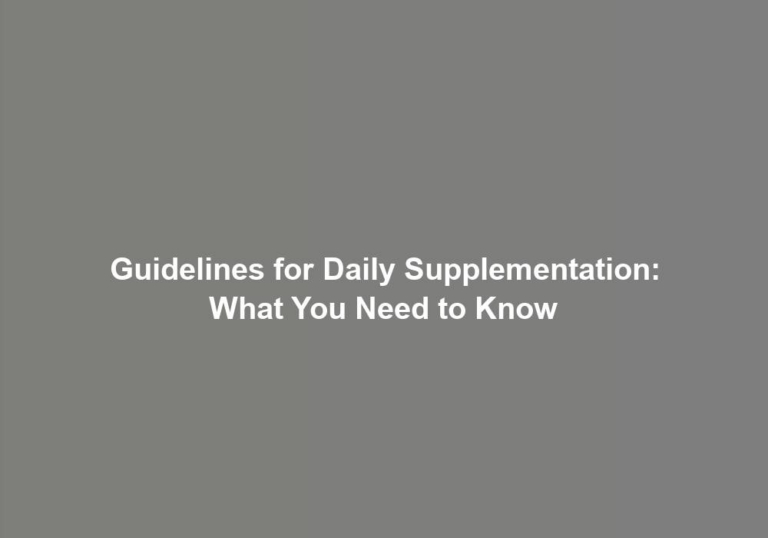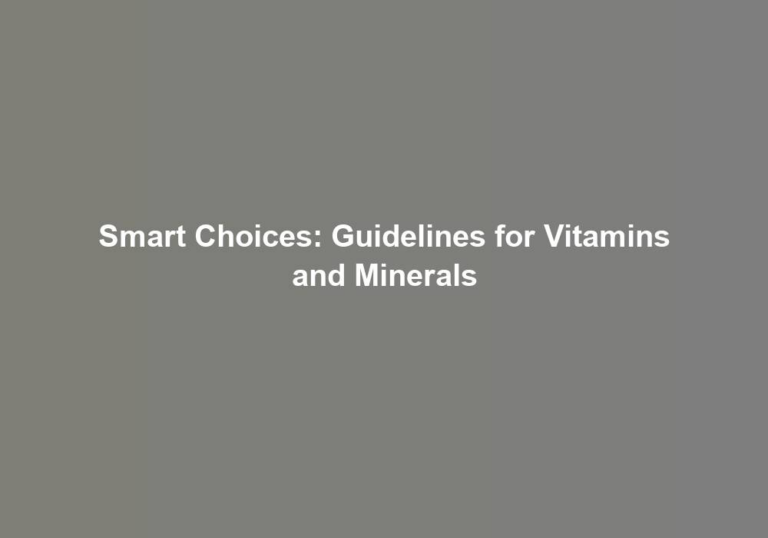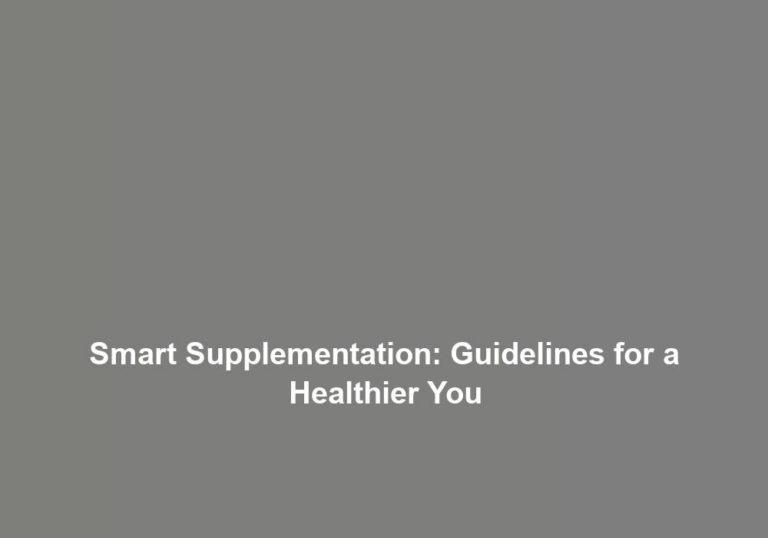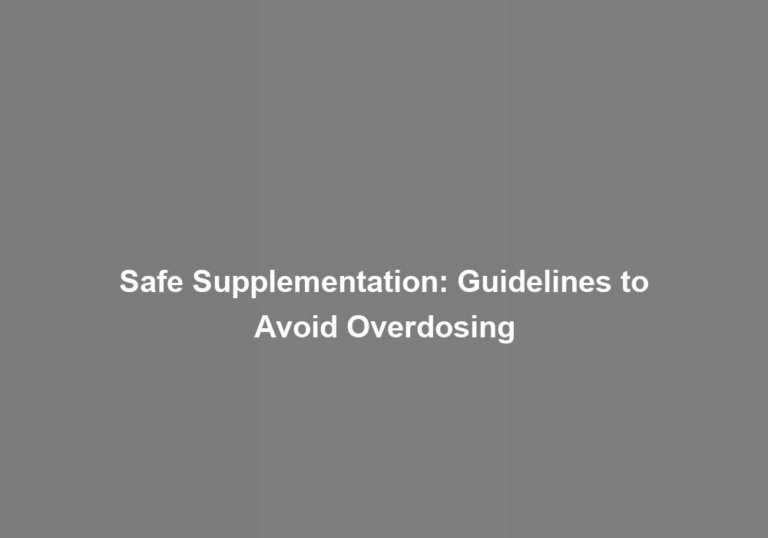Overdose Risks Unveiled: A Closer Look at Supplements
YouG??ve likely heard about the benefits of adding supplements to your daily routine, but have you ever considered the potential risks of overdoing it? As you navigate the aisles of health stores and scroll through endless online options, itG??s crucial to take a step back and consider the potential dangers that come with excessive supplement intake. But just how real are these risks, and what can you do to protect yourself? LetG??s take a closer look at the often overlooked issue of supplement overdose and what you can do to ensure your well-being.
Understanding Supplement Overdose
To understand supplement overdose, itG??s important to be aware of the potential risks and symptoms associated with excessive intake. Recognizing warning signs of supplement overdose is crucial for your well-being. Common symptoms include nausea, vomiting, diarrhea, and stomach pain. Additionally, you might experience headaches, dizziness, and weakness. If you notice these signs after taking supplements, itG??s essential to seek medical attention immediately.
Managing dosage levels is key to avoiding supplement overdose. Always follow the recommended dosage on the supplement label or as advised by a healthcare professional. More does not always mean better when it comes to supplements. ItG??s important to understand that exceeding the recommended dosage can have adverse effects on your health. ItG??s crucial to be mindful of the amount and frequency of supplement intake.
Incorporating supplements into your routine can be beneficial, but itG??s important to do so responsibly. By recognizing warning signs and managing dosage levels, you can mitigate the risks associated with supplement overdose. Remember that your health is the top priority, and being cautious with supplement intake is a proactive way to take care of yourself. If you have any concerns about the appropriate dosage for your specific needs, consult with a healthcare professional. Your well-being matters, so approach supplement use with attentiveness and care.
Commonly Overdosed Supplements
Certain supplements, when taken in excess, can pose significant health risks. ItG??s important to be aware of the dangers and consequences of overdosing on commonly consumed supplements. Here are a few examples of supplements that are frequently overdosed, along with their associated risks and precautions:
-
Vitamin D: Overconsumption of vitamin D can lead to an accumulation of calcium in the blood, resulting in symptoms such as nausea, vomiting, weakness, and frequent urination. In severe cases, it can even cause kidney damage. To minimize the risk, itG??s crucial to follow the recommended daily allowance and consult a healthcare professional before taking high doses of vitamin D supplements.
-
Iron: Excessive intake of iron supplements can lead to iron toxicity, causing symptoms such as vomiting, diarrhea, and abdominal pain. In severe cases, it can damage the liver and other organs. ItG??s important to keep iron supplements out of reach of children, as accidental overdose in children can be fatal.
-
Calcium: Overdosing on calcium supplements can lead to hypercalcemia, characterized by symptoms like excessive thirst, frequent urination, abdominal pain, and bone pain. Long-term overconsumption can also increase the risk of kidney stones. ItG??s essential to balance calcium intake with other nutrients and to consider dietary sources before resorting to supplements.
Understanding the risk factors and precautions associated with these commonly overdosed supplements is crucial for maintaining good health and avoiding potential harm. Always consult a healthcare professional before starting any new supplement regimen to ensure safe and appropriate usage.
Signs and Symptoms of Overdose
Recognizing the signs and symptoms of supplement overdose is crucial for prompt intervention and appropriate medical care. Awareness of these indicators is key to preventing serious health complications. Addressing signs of overdose starts with being mindful of changes in your body after taking supplements. Common symptoms of overdose include nausea, vomiting, diarrhea, abdominal pain, dizziness, and headaches. Experiencing these symptoms after taking supplements should prompt immediate action. Additionally, watch out for more severe signs such as rapid heartbeat, difficulty breathing, confusion, and loss of consciousness, as these could indicate a more serious overdose.
Overdose awareness involves being attuned to your bodyG??s responses and not ignoring any unusual or uncomfortable sensations. ItG??s important to be aware of the recommended dosage for each supplement and to avoid exceeding it. ItG??s also crucial to be mindful of the cumulative effect of taking multiple supplements that contain similar ingredients, as this can increase the risk of overdose.
Prevention is key in avoiding the harmful effects of supplement overdose. Always read and follow the recommended dosage on the product label. Consulting with a healthcare professional before starting any new supplement regimen is also a wise precaution. This is especially important if you have underlying health conditions or are taking other medications, as certain supplements may interact with them and increase the risk of overdose.
Prevention and Safety Measures
Being mindful of the recommended dosage for each supplement and avoiding exceeding it is crucial in preventing overdose and ensuring your safety. Here are some essential safety measures to help you prevent overdose and maintain your well-being:
-
Healthy Dosage: Always adhere to the recommended dosage provided on the supplement packaging or by your healthcare provider. ItG??s important to remember that G??moreG?? doesnG??t always mean G??better.G?? Taking excessive amounts of supplements can lead to adverse effects and potential overdose. Stick to the prescribed amount to achieve the intended benefits without risking your health.
-
Warning Signs: Educate yourself about the warning signs of potential overdose for specific supplements. Symptoms may vary depending on the type of supplement, but common signs include nausea, vomiting, dizziness, rapid heartbeat, and difficulty breathing. If you experience any of these symptoms after taking a supplement, seek medical attention immediately.
-
Consultation: Before starting any new supplement regimen, consult with a healthcare professional. They can provide personalized guidance based on your unique health needs and existing medications. Additionally, they can help you understand potential interactions and side effects, reducing the risk of accidental overdose and ensuring your safety.
Seeking Professional Guidance
If you are unsure about which supplements are suitable for your specific health needs, seek professional guidance from a qualified healthcare provider. Seeking professional advice is crucial to ensure that you are taking the right supplements in the correct dosage. Professional advice can help you understand potential health risks associated with certain supplements and prevent any adverse effects on your well-being.
A qualified healthcare provider can conduct a thorough assessment of your health status, including any existing medical conditions and medications you are currently taking. This information is essential for determining which supplements are safe and beneficial for you. Additionally, a healthcare provider can recommend specific supplements based on your individual needs, whether itG??s addressing a nutrient deficiency or supporting a particular health goal.
Moreover, seeking professional guidance can help you avoid potential interactions between supplements and medications. Some supplements may interfere with the effectiveness of certain medications or exacerbate underlying health issues. By consulting with a healthcare provider, you can minimize the risk of experiencing adverse effects caused by incompatible combinations of supplements and medications.
In essence, seeking professional advice when considering supplements is a proactive step towards safeguarding your health. Your healthcare provider can offer personalized recommendations, monitor your progress, and address any concerns that may arise. Remember that professional guidance is invaluable in navigating the complex landscape of supplements and ensuring that you make informed choices for your overall well-being.
Conclusion
Now that you have a better understanding of supplement overdose risks, are you confident in your knowledge of prevention and safety measures? Remember, seeking professional guidance is crucial in ensuring you are taking supplements safely and effectively. Stay informed and take the necessary steps to protect your health.

